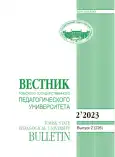Digital literacy of schoolchildren: profiles and evolution
- Authors: Glukhov A.P.1
-
Affiliations:
- Tomsk State Pedagogical University
- Issue: No 2 (2023)
- Pages: 101-110
- Section: DIGITALIZATION OF EDUCATION
- URL: https://bakhtiniada.ru/1609-624X/article/view/269032
- DOI: https://doi.org/10.23951/1609-624X-2023-2-101-110
- ID: 269032
Cite item
Full Text
Abstract
About the authors
Andrey Petrovich Glukhov
Tomsk State Pedagogical University
Email: GlukhovAP@tspu.edu.ru
ul. Kiyevskaya, 60, Tomsk, Russian Federation, 634061
References
- Солдатова Г. У. Цифровая социализация в культурно-исторической парадигме: изменяющийся ребенок в изменяющемся мире // Социальная психология и общество. 2018. Т. 9, № 3. С. 71–80.
- Солдатова Г. У., Рассказова Е. И., Чигарькова С. В. Виды киберагрессии: опыт подростков и молодежи // Национальный психологический журнал. 2020. № 2 (38). С. 3–20.
- Цифровая грамотность российских педагогов. Готовность к использованию цифровых технологий в учебном процессе / Т. А. Аймалетдинов, Л. Р. Баймуратова, О. А. Зайцева, Г. Р. Имаева, Л. В. Спиридонова. Аналитический центр НАФИ. М.: Издательство НАФИ, 2019. 84 с. URL: https://d-russia.ru/wp-content/uploads/2019/10/digit-ped.pdf (дата обращения: 10.10.2022).
- Оценка цифровой готовности населения России: докл. к XXII Апр. междунар. науч. конф. по проблемам развития экономики и общества, Москва, 13–30 апр. 2021 г. / Н. Е. Дмитриева (рук. авт. кол.), А. Б. Жулин, Р. Е. Артамонов, Э. А. Титов. М.: Изд. дом Высшей школы экономики, 2021. 86 с. URL: https://conf.hse.ru/mirror/pubs/share/464963752.pdf (дата обращения: 10.10.2022).
- Ilomäki L., Paavola S., Lakkala M., Kantosalo A. Digital competence – An emergent boundary concept for policy and educational research // Education and Information Technologies. 2016. № 21 (3). P. 655–679.
- Ferrari A. DIGCOMP: A framework for developing and understanding digital competence in Europe (Report EUR 26035 EN). JRC Technical Reports. Seville: Institute for Prospective Technological Studies, European Union. Luxembourg: Publications Office of the European Union, 2013. 45 p.
- Clifford I., Kluzer S., Troia S., Jakobsone M., Zandbergs U. DigCompSat. A Self-reflection Tool for the European Digital Competence Framework for Citizens. Luxembourg: Publications Office of the European Union, 2020. 174 p.
- Gilster P. Digital literacy. New York: John Wiley, 1997. 276 p.
- Joosten T., Pasquini L., Harness L. Guiding social media at our institutions // Planning for Higher Education. 2012. № 41 (1). P. 125–135.
- Gourlay L., Hamilton M., Lea M. R. Textual practices in the new media digital landscape: Messing with digital literacies. Research in Learning Technology. 2013. № 21. P. 21438.
- Mishra K. E., Wilder K., Mishra A. K. Digital literacy in the marketing curriculum: Are female college students prepared for digital jobs? // Industry and Higher Education. 2017. № 31 (3). P. 204–211.
- Chan B. S., Churchill D., Chiu T. K. Digital literacy learning in higher education through digital storytelling approach // Journal of International Education Research (JIER), 2017. № 13 (1). P. 1–16.
- De Wet C. Trends in digital pedagogies: Implications for South African universities expanding through hybrid online education // Mediterranean Journal of Social Sciences. 2014. № 5 (23). P. 859–867.
- Солдатова Г. В., Зотова Е. Ю., Чекалина А. И., Гостимская О. С. Пойманные одной сетью: социально-психологическое исследование представлений детей и взрослых об интернете / под ред. Г. В. Солдатовой. М., 2011. 176 с.
- Дети и технологии / Т. А. Аймалетдинов, Л. Р. Баймуратова, В. И. Гриценко, О. А. Долгова, Г. Р. Имаева. М.: Издательство НАФИ, 2018. 72 с.
- Smahel D., Machackova H., Mascheroni G., Dedkova L., Staksrud E., Ólafsson K., Livingstone S., Hasebrink U. EU Kids Online 2020: Survey results from 19 countries. EU Kids Online. 2020.
- Soldatova G. U., Rasskazova E. I., Chigarkova S. V. Digital Socialization of Adolescents in the Russian Federation: Parental Mediation, Online Risks, and Digital Competence // Psychology in Russia: State of the Art. 2020. V. 13, № 4. P. 191–206.
- Глухов А. П., Стаховская Ю. М. Цифровой разрыв в фокусе межпоколенческой коммуникации // Вестник Томского государственного университета. Философия. Социология. Политология. 2021. № 59. С. 148–155.
- Lazonder A. W., Walraven A., Gijlers H., Janssen N. Longitudinal assessment of digital literacy in children: Findings from a large Dutch single-school study // Computers & Education. 2020. Vol. 143. P. 103681.
- Lambic D. Correlation between Facebook use for educational purposes and academic performance of students // Computers in Human Behavior. 2016. № 61. P. 313–320.
- Hu J., Yu R. The effects of ICT-based social media on adolescents’ digital reading performance: A longitudinal study of PISA 2009, PISA 2012, PISA 2015 and PISA 2018 // Computers & Education. 2021. Vol. 175. P. 104342.
- Hatlevik O. E., Guðmundsdóttir G. B., Loi M. Examining Factors Predicting Students’ Digital Competence // Journal of Information Technology Education: Research. 2015. № 14 (14). P. 123–137.
- Siddiq F., Gochyyev P., Wilson M. Learning in Digital Networks – ICT literacy: A novel assessment of students’ 21st century skills // Computers & Education. 2017. Vol. 109. P. 11–37.
- Jenkins H., Clinton K., Purushotma R. etc. Confronting the Challenges of Participatory Culture: Media Education for the 21st Century// An occasional paper on digital media and learning. The MacArthur Foundation, 2006.
Supplementary files






